Gardeners Queens Park: Cultivating Green Spaces in the Heart of the City
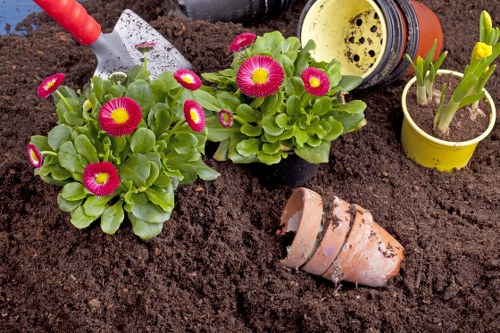
Queens Park is a vibrant hub for gardeners and green enthusiasts alike. Nestled in the bustling city, it offers a serene escape where nature thrives amidst urban life. Whether you are a seasoned gardener or just starting your green journey, Queens Park provides ample opportunities to cultivate your passion.
The park boasts a diverse range of flora, making it a perfect spot for experimenting with different gardening techniques. From vibrant flower beds to lush vegetable gardens, Queens Park caters to all gardening styles. Its well-maintained paths and abundant sunlight create an ideal environment for plants to flourish.
Community involvement is a cornerstone of Queens Park's gardening scene. Local gardeners often collaborate on projects, share tips, and participate in workshops. This sense of community not only enhances the gardening experience but also fosters a deeper connection with nature and fellow enthusiasts.
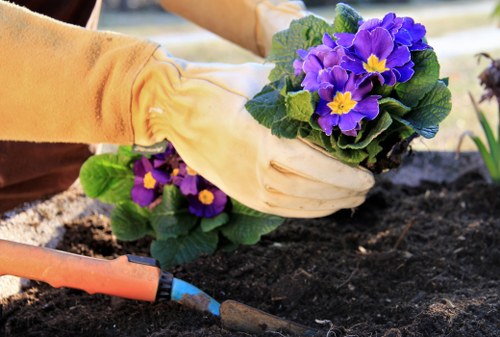
The Importance of Gardening in Queens Park
Gardening in Queens Park isn't just a hobby; it's a way of life. Engaging in gardening activities offers numerous benefits, both physical and mental. Tending to plants can be a therapeutic activity, reducing stress and promoting relaxation. Additionally, gardening encourages physical exercise, contributing to overall health and well-being.
Queens Park serves as a green oasis, providing residents with a space to unwind and connect with nature. The presence of well-maintained gardens enhances the park's aesthetic appeal, making it a popular destination for families, fitness enthusiasts, and nature lovers.
Moreover, gardening in Queens Park contributes to environmental sustainability. Plants play a crucial role in improving air quality, reducing urban heat islands, and supporting local biodiversity. By cultivating gardens, residents actively participate in creating a healthier and more sustainable urban environment.
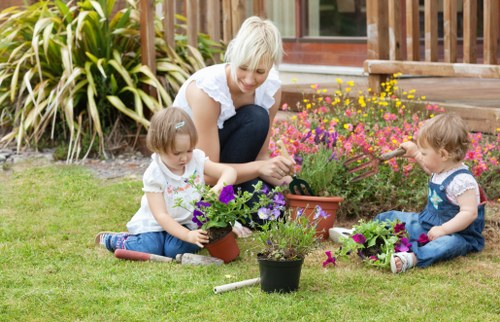
Popular Gardening Activities in Queens Park
- Flower Gardening: Queens Park is renowned for its stunning array of flowers. Gardeners often plant seasonal blooms such as roses, tulips, and daisies, creating colorful displays throughout the park.
- Vegetable Gardening: Many enthusiasts cultivate vegetable gardens, growing everything from tomatoes and cucumbers to herbs like basil and mint. This not only provides fresh produce but also promotes self-sufficiency.
- Community Gardens: Community gardens are a staple in Queens Park, allowing residents to collaborate on larger gardening projects. These shared spaces foster a sense of community and collective responsibility.
- Container Gardening: For those with limited space, container gardening offers a versatile solution. Gardeners use pots, planters, and other containers to grow a variety of plants, both indoors and outdoors.
- Ornamental Gardening: Ornamental gardens focus on aesthetic appeal, incorporating elements like topiaries, water features, and decorative stones to create visually pleasing landscapes.
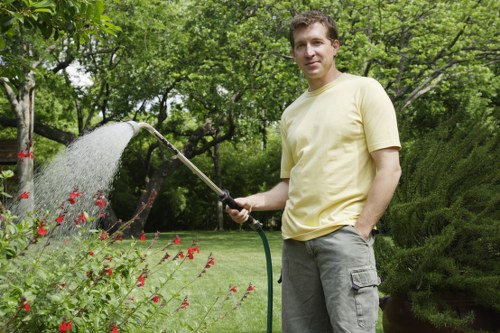
Essential Tips for Gardeners in Queens Park
Whether you're new to gardening or looking to enhance your skills, these tips can help you make the most of your time in Queens Park:
- Choose the Right Plants: Select plants that are well-suited to the local climate and soil conditions. Consider factors like sunlight availability, water requirements, and growth patterns.
- Soil Preparation: Healthy soil is the foundation of a thriving garden. Amend the soil with compost and organic matter to improve its texture and fertility.
- Proper Watering: Water your plants consistently, ensuring that the soil remains moist but not waterlogged. Early morning is the best time to water to reduce evaporation and prevent disease.
- Regular Maintenance: Keep your garden tidy by removing weeds, pruning dead or overgrown branches, and regularly checking for pests and diseases.
- Use Mulch: Mulching helps retain soil moisture, suppress weeds, and regulate soil temperature. Organic mulches like bark or straw are excellent choices.
- Seek Community Support: Join local gardening groups or attend workshops in Queens Park to exchange knowledge and gain new insights.
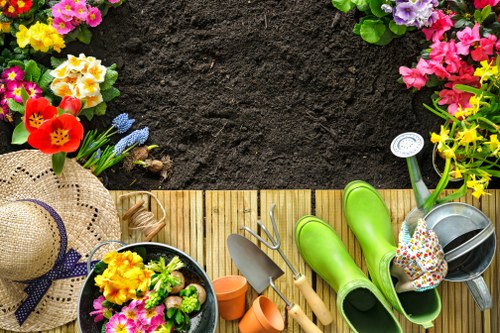
Gardening Tools and Equipment
Having the right tools can significantly enhance your gardening experience in Queens Park. Here are some essential tools every gardener should have:
- Hand Tools: A good set of hand tools, including trowels, pruners, and cultivators, is essential for various gardening tasks.
- Watering Equipment: Invest in quality watering cans or hoses with adjustable nozzles to cater to different plant needs.
- Gardening Gloves: Protect your hands from dirt, thorns, and potential injuries with a sturdy pair of gardening gloves.
- Wheelbarrow: A wheelbarrow is useful for transporting soil, compost, and plants around the garden.
- Compost Bin: Create your own compost to recycle kitchen scraps and garden waste, enriching your soil naturally.
- Garden Kneeler: A garden kneeler provides comfort and support while planting or weeding.
Proper maintenance of your tools ensures they last longer and perform better. Clean and store them in a dry place after each use.
Seasonal Gardening in Queens Park
Gardening activities in Queens Park vary with the seasons. Understanding seasonal changes can help you plan and execute your gardening tasks more effectively.
Spring
Spring is a time of renewal and growth. It's the perfect season to plant new flowers and vegetables. Start seeds indoors or directly sow them in the garden beds as the weather warms.
Summer
Summer brings abundant sunlight, which is ideal for growing a variety of plants. Regular watering and mulching are crucial to keep plants healthy and prevent them from wilting.
Autumn
Autumn is the season for harvesting and preparing your garden for the colder months. Clean up fallen leaves, mulch garden beds, and plant bulbs for spring blooms.
Winter
Winter may seem dormant, but it's a great time for planning and maintenance. Protect sensitive plants from frost and take inventory of your gardening supplies.
Benefits of Gardening in Queens Park
Gardening offers a myriad of benefits that extend beyond aesthetics. Here are some key advantages of gardening in Queens Park:
- Health Benefits: Gardening provides physical exercise, improves flexibility, and can lower blood pressure. It also offers mental health benefits by reducing stress and enhancing mood.
- Environmental Impact: Gardens contribute to better air quality, support local wildlife, and help in carbon sequestration.
- Economic Savings: Growing your own vegetables and herbs can lead to significant savings on grocery bills.
- Educational Opportunities: Gardening teaches valuable lessons about plant biology, ecology, and sustainability.
- Social Interaction: Community gardens foster social connections and build a sense of community among residents.
Local Relevance: Nearby Areas to Queens Park
Queens Park is surrounded by several vibrant neighborhoods, each offering unique features that appeal to gardeners:
- Holland Park: Located just south of Queens Park, Holland Park is known for its expansive gardens and the famous Holland Park Avenue, lined with mature trees and beautiful flowerbeds.
- Kensington: Adjacent to Queens Park, Kensington offers a mix of residential areas and community gardens, perfect for those looking to expand their gardening horizons.
- Ladbroke Grove: To the west of Queens Park, Ladbroke Grove features urban gardens and green rooftops, providing innovative gardening solutions in an urban setting.
- Maida Vale: East of Queens Park, Maida Vale is home to several private gardens and garden clubs, fostering a strong gardening community.
- Chiswick: A short distance from Queens Park, Chiswick boasts riverside gardens and numerous public green spaces ideal for gardening enthusiasts.
- Notting Hill: Known for its colorful houses and vibrant markets, Notting Hill also offers hidden garden gems perfect for urban gardeners.
- Regent's Park: Just north of Queens Park, Regent's Park is one of London's Royal Parks, featuring beautifully landscaped gardens and extensive plant collections.
- Little Venice: Near Queens Park, Little Venice offers picturesque canalside gardens, providing a tranquil setting for gardening activities.
- Maida Hill: West of Queens Park, Maida Hill has numerous community gardens and local plant nurseries catering to gardeners of all levels.
- Perivale: Further west, Perivale offers spacious backyards and private gardens, allowing for more extensive gardening projects.
Connecting with the Gardening Community
Queens Park's gardening community is vibrant and welcoming. Here are ways to connect and engage:
- Join Local Gardening Groups: Engage with like-minded individuals by joining local gardening clubs and groups. These communities offer support, advice, and opportunities to participate in collaborative projects.
- Attend Workshops and Events: Keep an eye out for gardening workshops, seminars, and events held in Queens Park. These events are excellent for learning new skills and staying updated on gardening trends.
- Volunteer: Volunteering in community gardens or park maintenance projects is a great way to give back and deepen your connection with the community.
- Share Your Experience: Document your gardening journey through blogs, social media, or local newsletters. Sharing your experiences can inspire others and foster a sense of community.
Gardening Resources in Queens Park
To support your gardening endeavors, Queens Park offers a variety of resources:
- Local Nurseries: Numerous nurseries in and around Queens Park provide a wide selection of plants, seeds, and gardening supplies.
- Community Centers: Community centers often host gardening classes and provide access to shared garden spaces.
- Online Forums: Participate in online gardening forums and social media groups dedicated to Queens Park gardeners for tips and support.
- Libraries: Local libraries offer gardening books and magazines that can serve as valuable references.
Sustainable Gardening Practices
Embracing sustainability in your gardening practices not only benefits the environment but also enhances the longevity and productivity of your garden. Here are some sustainable gardening practices suitable for Queens Park:
- Composting: Turn kitchen scraps and garden waste into nutrient-rich compost to improve soil health and reduce landfill waste.
- Rainwater Harvesting: Collect rainwater to use for watering plants, reducing reliance on tap water and conserving resources.
- Native Plants: Incorporate native plants into your garden as they require less maintenance, water, and are better adapted to the local climate.
- Organic Gardening: Avoid chemical pesticides and fertilizers. Use natural alternatives to protect your plants and soil.
- Mulching: Apply mulch to retain soil moisture, suppress weeds, and regulate soil temperature.
- Crop Rotation: Rotate your crops annually to prevent soil depletion and reduce the risk of pests and diseases.
By adopting these practices, gardeners in Queens Park can create sustainable and resilient gardens that contribute positively to the environment.
Urban Gardening Solutions
Urban gardening in Queens Park presents unique challenges, such as limited space and accessibility. Here are some solutions to maximize your gardening potential:
- Vertical Gardening: Utilize vertical space by growing plants on trellises, walls, or vertical planters. This approach saves space and adds visual interest.
- Rooftop Gardens: If you have access to a rooftop, consider setting up a rooftop garden. It's an excellent way to grow plants while enjoying city views.
- Hydroponics: Hydroponic systems allow you to grow plants without soil, making them ideal for small spaces and indoor gardening.
- Container Gardens: Use containers of various sizes to create adaptable and portable gardens. Containers can be moved to optimize sunlight exposure.
- Community Shared Spaces: Participate in or establish shared gardening spaces within the community to pool resources and collaborate on larger projects.
Gardening Challenges in Queens Park
Like any gardening environment, Queens Park presents its own set of challenges. Being aware of these can help you prepare and overcome obstacles effectively:
- Pest Control: Common pests like aphids, slugs, and snails can damage plants. Implement natural pest control methods such as introducing beneficial insects or using organic repellents.
- Disease Management: Fungal diseases and bacterial infections can affect plant health. Ensure proper spacing, adequate airflow, and avoid overwatering to prevent disease outbreaks.
- Weather Extremes: Sudden weather changes, including heavy rains or droughts, can impact your garden. Use protective coverings and implement water conservation techniques to mitigate these effects.
- Soil Quality: Poor soil quality can hinder plant growth. Regularly amend the soil with compost and other organic matter to maintain its fertility and structure.
- Space Constraints: Limited space may restrict the types and number of plants you can grow. Plan your garden layout carefully and consider compact or dwarf plant varieties.
Overcoming Gardening Challenges
Addressing these challenges requires proactive planning and adaptable strategies:
- Integrated Pest Management (IPM): Combine biological, cultural, and mechanical methods to manage pests sustainably. This reduces reliance on chemical pesticides and promotes a healthy garden ecosystem.
- Crop Diversification: Plant a variety of species to reduce the risk of widespread disease and pest infestations. Diverse gardens are more resilient and support a wider range of beneficial insects.
- Water Management: Implement efficient watering systems, such as drip irrigation, to conserve water and ensure consistent moisture levels for plants.
- Soil Testing: Conduct regular soil tests to monitor pH levels and nutrient content. This information guides appropriate soil amendments and fertilization strategies.
- Season Extension: Use techniques like cold frames, greenhouses, or row covers to extend the growing season, allowing for earlier planting and later harvesting.
Choosing the Right Plants for Queens Park
Selecting the appropriate plants is crucial for a successful garden in Queens Park. Consider the following factors when choosing plants:
- Climate: Understand the local climate, including temperature ranges, rainfall patterns, and seasonal changes. Choose plants that are well-adapted to these conditions.
- Sunlight: Assess the amount of sunlight different areas of your garden receive. Some plants thrive in full sun, while others prefer partial shade or full shade.
- Soil Type: Determine your soil type, whether it's sandy, clayey, or loamy. Different plants have varying soil preferences, so select those that match your soil conditions.
- Water Requirements: Consider the water needs of your plants. Opt for drought-tolerant varieties if water conservation is a priority.
- Growth Habit: Choose plants that complement the available space and desired garden design. Compact plants are ideal for small spaces, while larger varieties can serve as focal points.
Recommended Plants for Queens Park
Here are some plant recommendations that thrive in Queens Park's environment:
- Roses: Classic and beautiful, roses add color and fragrance to any garden. They require well-drained soil and plenty of sunlight.
- Lavender: Known for its soothing aroma, lavender is a low-maintenance plant that attracts pollinators like bees and butterflies.
- Tomatoes: A favorite among vegetable gardeners, tomatoes are versatile and can be grown in containers or garden beds.
- Herbs: Basil, mint, thyme, and rosemary are excellent choices for culinary gardens. They are easy to grow and boost your kitchen with fresh flavors.
- Hostas: Ideal for shaded areas, hostas offer lush foliage and come in various sizes and colors.
- Succulents: Perfect for container gardens, succulents are drought-resistant and require minimal maintenance.
- Marigolds: Bright and cheerful, marigolds help repel pests and add vibrant colors to your garden.
- Peonies: These perennial flowers provide spectacular blooms and are relatively easy to care for.
- Beans: Climbing and bush varieties of beans are productive and add a vertical element to your vegetable garden.
- Ferns: Decorative and hardy, ferns are excellent for adding texture and greenery to shaded garden areas.
Gardening for All Ages
Queens Park welcomes gardeners of all ages, making it a perfect place for family gardening activities and community engagement:
- Children's Gardens: Designated areas where children can learn about plants, participate in planting, and develop a love for nature.
- Senior Gardening Programs: Programs tailored for seniors, offering gentle gardening activities that promote physical activity and social interaction.
- Educational Workshops: Workshops focused on teaching gardening skills to various age groups, ensuring everyone can participate and benefit.
- Accessible Gardening: Implementing accessible garden designs that accommodate gardeners with disabilities, ensuring inclusivity for all.
Benefits of Multi-generational Gardening
Encouraging gardening across different age groups fosters intergenerational connections and shared knowledge. Ancestors can pass down traditional gardening techniques, while younger generations can introduce modern practices, creating a rich and diverse gardening culture.
Gardening Events and Festivals
Queens Park hosts a variety of gardening events and festivals throughout the year, celebrating the community's love for horticulture:
- Spring Flower Festival: A vibrant celebration showcasing the park's stunning spring blooms, featuring guided tours and flower arranging workshops.
- Harvest Festival: An autumn event focusing on harvesting produce, with cooking demonstrations, stalls selling fresh vegetables, and educational talks on sustainable harvesting practices.
- Community Plant Exchange: A monthly event where gardeners can exchange plants, seeds, and gardening tips, fostering community spirit and plant diversity.
- Gardening Competitions: Friendly competitions encouraging gardeners to showcase their best plants, gardens, and gardening innovations.
- Workshops and Seminars: Regular workshops covering topics like organic gardening, pest management, and landscape design, led by gardening experts.
Participating in Gardening Events
Engaging in these events offers numerous benefits, including learning new skills, meeting fellow gardeners, and gaining inspiration for your own garden. Participation also strengthens the gardening community, promoting collaboration and shared growth.
Future of Gardening in Queens Park
The future of gardening in Queens Park is poised for growth and innovation. As urban spaces continue to develop, sustainable and community-focused gardening practices will become increasingly important:
- Vertical and Rooftop Gardens: As space becomes limited, gardeners will explore innovative ways to maximize vertical and rooftop areas for growing plants.
- Smart Gardening: Incorporating technology such as automated watering systems, sensors, and gardening apps to enhance efficiency and plant care.
- Urban Farming: Expanding urban farming initiatives to promote local food production and reduce the environmental footprint of food transportation.
- Green Infrastructure: Integrating gardens into urban infrastructure projects, such as green walls on buildings and public transport stations.
- Environmental Education: Increasing focus on environmental education through gardening programs, teaching the community about sustainability and conservation.
- Biodiversity Enhancement: Promoting biodiversity by planting a wider variety of native and pollinator-friendly plants, supporting local wildlife populations.
Embracing Change
Adapting to changing environmental conditions and urban dynamics will be key to the continued success of gardening in Queens Park. Embracing new ideas and technologies while maintaining traditional practices will ensure a vibrant and resilient gardening community.
Conclusion
Queens Park stands as a beacon for gardeners, offering a harmonious blend of nature and community within an urban setting. Whether you're nurturing a vibrant flower bed, cultivating your own vegetables, or participating in community garden projects, Queens Park provides the perfect environment to grow and thrive.
By embracing sustainable practices, connecting with fellow gardeners, and participating in local events, you can enhance not only your gardening experience but also contribute to the overall well-being of the community and the environment.
As the gardening scene in Queens Park continues to evolve, it remains a testament to the power of nature and community in creating a greener, healthier, and more connected urban landscape.
Frequently Asked Questions
- 1. What types of plants are best suited for gardening in Queens Park?
Queens Park's climate is suitable for a wide variety of plants, including roses, lavender, tomatoes, herbs, and native plants. It's essential to choose plants that match the local climate, soil conditions, and sunlight availability.
- 2. How can I get involved with the gardening community in Queens Park?
You can join local gardening groups, attend workshops and events, volunteer in community gardens, or participate in plant exchanges. Engaging with online forums and social media groups dedicated to Queens Park gardening is also a great way to connect with fellow enthusiasts.
- 3. What are some sustainable gardening practices I can adopt in Queens Park?
Sustainable practices include composting, rainwater harvesting, using native plants, practicing organic gardening, mulching, and rotating crops. These methods help conserve resources and promote a healthy garden ecosystem.
- 4. Are there any gardening workshops or events held regularly in Queens Park?
Yes, Queens Park hosts various gardening events and workshops throughout the year, such as the Spring Flower Festival, Harvest Festival, Community Plant Exchange, and regular seminars on topics like organic gardening and pest management.
- 5. How can I maximize my gardening space in an urban setting like Queens Park?
Consider vertical gardening, container gardening, rooftop gardens, and hydroponic systems to maximize space. Utilizing vertical areas and shared gardening spaces can help you grow more plants even in limited spaces.


